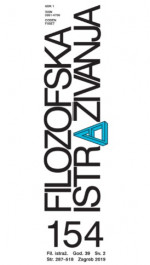Fenomenologija odnosa nacionalnoga i kulturnoga identiteta u hrvatskom društvu
Phenomenology of the Relation between National and Cultural Identity in Croatian Society
Author(s): Erik BrezovecSubject(s): Epistemology, Nationalism Studies, Phenomenology, Politics and Identity
Published by: Hrvatsko Filozofsko Društvo
Keywords: cultural identity; national identity; nationalism; social construction of reality; intentional consciousness; knowledge stock; meaning; duality;
Summary/Abstract: This paper aims to analyse the phenomenology of the interdependence of national and cultural identity in Croatian society and present how the empowerment of national and cultural identity in the Croatian society generates an individual expression of being Croatian. To be able to speak about this process, it is essential to define the relationship between cultural and national identity in the Republic of Croatia. A duality of influence characterises this relationship. Cultural identity is an essential element of the construction of a national, which determines the direction of cultural dynamics. The phenomenological level of theoretical analysis of the mentioned phenomenon places the internalisation of the identity constituents into the focus. As consciousness is always intentional, or intent on an object, it is necessary to study the ways of understanding the building of an individual’s identity throughout the collectively provided stocks of knowledge. Such type of construction or internalisation of collective assumptions presupposes the relative independence of the actors in the construction of their reality. Relative independence as a term stems from the inability to separate the action from the structural frameworks on issues of identity. An individual is free to form the meaning, but that meaning is created within a particular context and frame. This context inherently creates the essence of available knowledge. The basic problem with the knowledge of national and cultural identity (in the broader sense of the culture) is that this knowledge is enabled in two dominant polar variants. An individual constructs his identity through a variety of knowledge supply, dominant (or accessible) through his life. Such a process of realising a person dispels a national identity. In the phenomenological sense, the very conception of Croats and being Croatian at the individual level is plural and ambiguous.
Journal: Filozofska istraživanja
- Issue Year: 39/2019
- Issue No: 02/154
- Page Range: 415-426
- Page Count: 12
- Language: Croatian

